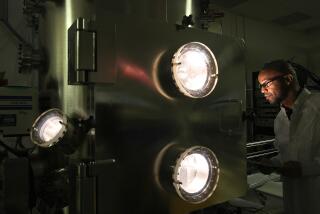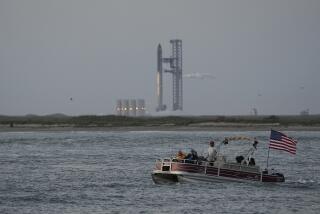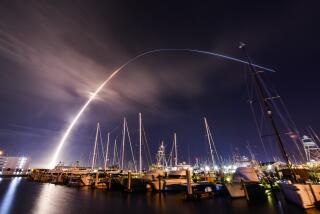Aerojet makes long-shot bid against Bezos’ space company to supply rocket engine
Their partnership was announced at a splashy news conference in Washington, and in the year since, the marriage has appeared solid: United Launch Alliance has repeatedly said it is standing by Jeffrey P. Bezos’ space company as its chosen rocket-engine supplier.
But another company is questioning whether that deal is in the best interests of the Pentagon’s space program. Aerojet Rocketdyne, an engine builder with roots in the earliest years of space flight, is taking an increasingly aggressive stand to try to get its product into the rocket being designed by ULA for government launches.
ULA has long had a monopoly on launching national security satellites for the Pentagon and intelligence community.
Aerojet made a bold move this year that would have secured a spot for its engine — a $2-billion offer to acquire ULA, which is a 50-50 joint venture between Lockheed Martin Corp. and Boeing Co. The offer was quickly rejected, so Aerojet still doesn’t have a sure customer for its engine.
But in an interview Monday with the Washington Post, company executives said they are confident that they will ultimately be able to convince ULA that their engine is the better option. Aerojet has invested a lot of time and money into the development of an engine, and if ULA doesn’t buy it, it’s not clear who would. So the Sacramento-based company is not giving up on what may be a long-shot bid.
“We intend to be successful,” said Julie Van Kleeck, Aerojet’s vice president for space and launch systems.
Aerojet has a 70-year pedigree that includes breakthroughs in rocket propulsion that Van Kleeck said is unmatched in the industry. She said building the engine that is going to launch national security systems that help soldiers communicate and analysts gather intelligence shouldn’t be left to a relatively unproven company.
“We’re the only U.S. company that has ever developed and flown large booster engines, and we’ve done it many times,” she said. “We have a very rigorous schedule plan, and we know what it takes to develop rocket engines.”
But ULA has repeatedly said that Aerojet’s engine is not as far along in development, and therefore is a backup to the engine being made by Bezos’ Blue Origin. (Bezos, the founder of Amazon.com, also owns the Washington Post). Still, ULA has left the door at least partially open, saying that it could choose the AR-1 if something were to happen to Blue Origin’s engine.
In a statement, Blue Origin President Rob Meyerson said the company’s engine is four years into development and “offers the lowest cost and highest performance for national security space missions.”
A ULA spokesman did not respond to a request for comment.
Van Kleeck said Aerojet has been working on its engine for years and would hit the 2019 target that ULA has said is its goal. She also said the AR-1 is more versatile than Blue’s engine, the BE-4, because it would work in the Atlas V as well as the Vulcan, the rocket that ULA is developing.
“We’re confident we can have a booster engine for 2019 that can address our country’s national security interests at the lowest cost and the lowest risk,” she said.
ULA uses the Russian-made RD-180 engine in its Atlas V rocket. But it has been under pressure to develop an American-made engine since tensions with Russia surged over Ukraine.
Congress has imposed strict limits on the use of Russian-made engines for national security launches, and ULA Chief Executive Tory Bruno has said that could impinge on the company’s ability to compete for upcoming launch contracts. It is also facing competition for the first time now that SpaceX is certified to bid for the lucrative launch contracts.
In his statement, Meyerson said the BE-4 would be qualified for flight by 2017, in time for the first Vulcan launch in 2019.
“The BE-4 is the fastest path to a domestic alternative to the Russian RD-180 and, uniquely, it is not dependent on U.S. government funding but is fully funded by the private sector,” he said.
Aerojet said it is bidding on an Air Force contract that could provide government funding for a new, American-made engine.
Despite being a backup plan, Van Kleeck said she thinks the company can eventually supplant Blue Origin.
When ULA initially chose Blue Origin, it was “based on economic reasons,” she said. “We think assured access [to space] is the real key issue, rather than economics. And as they look at the urgency of that, the AR-1 is becoming more and more the direction.”
That remains to be seen. In a call with reporters this month, Bruno reiterated his commitment to the Blue Origin engine, saying the company was 16 months ahead in its development.
Davenport writes for the Washington Post.






